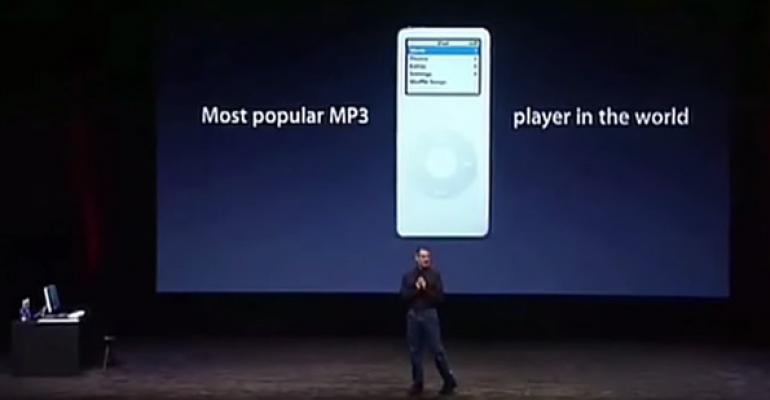A trial beginning today in Oakland, California will pit Apple against an antitrust class action brought by individuals and businesses who claim the consumer electronics giant illegally prevented them from using non-Apple music on their iPods. The case is almost a decade old and dates back to the pre-iPhone era when Apple's industry influence came solely from iPods and iTunes. But the big pull here is that former Apple CEO Steve Jobs, who passed away in 2011, will play a major role in the trial.
This isn't the first time Mr. Jobs has impacted an antitrust case since his passing: Apple was found guilty of colluding with the biggest book publishers on earth to harm competitors and consumers by artificially raising the price of e-books, and emails sent to and from Jobs played a major role in determining Apple's guilt.
The iPod case is a bit different. In the e-book case, Apple had worked with partners to undermine the industry leader Amazon so it could try and gain a foothold in that market with its iPad and iBooks software. But the iPod case is older, and Apple was at that time the market leader, accused of artificially preventing competition from eating into its dominance.
Apple released its first iPod in late 2001, and while it was generally hailed for its stellar design and build quality, its high price and Mac requirement made it a niche product. But Apple eventually saw great success with the iPod after it slashed prices and opened up both the device and the iTunes music store software to Windows users. Within a few years, the iPod was the dominant MP3 player, and digital device.
But Apple also played unfairly, the class action alleges. It prevented other firms from licensing the FairPlay DRM technology that locked iTunes music purchases to the iPod and to Apple software, and it prevented competitors from letting iPod users access their competing music services. When companies tried to provide this compatibility—as RealNetworks did repeatedly in the mid-2000s—Apple changed the software on the iPod and in iTunes to prevent it. In Real's case, Apple even accused the company of "hacking" the iPod.
Apple finally dropped FairPlay in 2009, and was widely applauded at the time for being an industry leader in DRM-free music. But RealNetworks had in fact dropped DRM from its own service in 2008, and of course several other smaller companies also offered DRM-free music by that time. Regardless, the class action lawsuit dates to the period of time between 2006 and 2009.
In some ways, the stakes aren't very high: The class action is seeking about $350 million in damages, and though the award would automatically triple to about $1 billion because of antitrust laws, that amount is a pittance when compared to Apple's quarterly profits. In the most recent quarter, for example, Apple posted a net profit of $8.5 billion. But the presence of Steve Jobs, if virtually, is driving more interest in the case.
A video deposition of Mr. Jobs defending his actions, and those of his company, will be played during the trial, and many email messages sent by the mercurial former CEO will be entered as evidence. One example published by the New York Times shows that Jobs was ever-ready to prevent its competitors from chipping away at iPod or iTunes.
"We need to make sure that when [rival service] Music Match launches their download music store they cannot use iPod," an email penned by Mr. Jobs reads. "Is this going to be an issue?"
One of the more polarizing characters in the history of technology, Jobs was both visionary and bully, and even his official biography paints an unflattering picture of a man who didn't care much for people or their feelings. But in many ways, Apple's behavior at the time is understandable: Like Microsoft before it, Apple continued being belligerent and bullying long after it rose to dominance because that was the mindset that hadn't gotten it to that position in the first place.
The question here is whether Apple ever achieved a monopoly position in the markets in question—MP3 players and digital music—because, if so, the company is held to a different behavioral standard.




